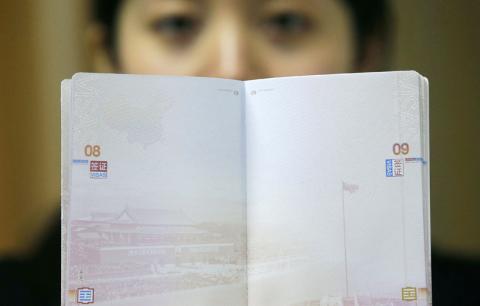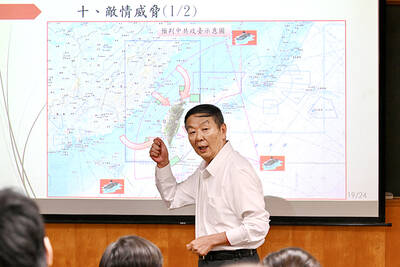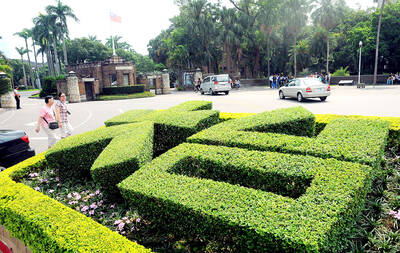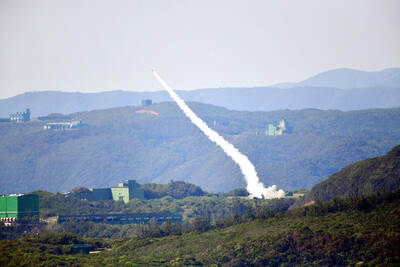Taipei joined a number of governments in the region yesterday in severely criticizing Beijing for the inclusion in newly revised passports of an outline of China that includes the entire South China Sea, hemmed in by dashes, as well as depictions of scenic spots in Taiwan — Nantou’s Sun Moon Lake and Hualien’s Chingshui Cliffs.
The change, which was first reported by the Financial Times on Wednesday, highlights China’s longstanding claim to the South China Sea in its entirety, though parts of the waters are also claimed by Taiwan, the Philippines, Vietnam, Brunei and Malaysia.
China’s official maps have long included Taiwan and the South China Sea as Chinese territory, but the act of including those in its passports could be seen as a provocation since it would require other nations to tacitly endorse those claims by affixing their official seals to the documents.

Photo: Reuters
Presidential Office spokesman Fan Chiang Tai-chi (范姜泰基) said President Ma Ying-jeou (馬英九) hoped China would not take inappropriate action to break the hard-earned stability across the Taiwan Strait.
Fan Chiang said the two famous tourist destinations are “under the jurisdiction of the Republic of China [ROC] government and not under the control of China.”
He said Ma had instructed the Mainland Affairs Council to issue a statement on the issue.
Fang Chiang said the government promotes cross-strait exchanges on the basis of “not recognizing each other’s sovereignty and not denying each other’s right to rule.”
“At present, cross-strait relations are enjoying the most unprecedented peace and stability in six decades,” Fang Chiang said.
In an unusually strongly worded statement, the council urged the Chinese government to address the issue of Taiwan’s sovereignty pragmatically.
The council said the two top tourist sites are part of ROC territory and that China’s move had damaged the mutual trust between the two sides of the Taiwan Strait.
“China has ignored the truth and sparked disputes by including pictures of our territory and landscape in its new Chinese passports. The ROC government will not accept its act,” it said.
“It should put aside disputes and face up to the reality. We urge it to avoid giving the impression that it is trying to change the status quo unilaterally and creating obstacles in cross-strait development,” it said.
The Ministry of Foreign Affairs declined to comment on the matter. In accordance with the division of functions between government departments, China-related affairs are under the mandate of the council, ministry spokesperson Steve Hsia (夏季昌) said.
The pan-green camp said the unilateral move had “infringed on Taiwan’s territorial sovereignty” and demanded that Ma protest the move.
“This is an obvious violation of Taiwan’s territorial sovereignty and Ma and the council should immediately file protests against Beijing. If the council sits on the issue and does nothing about it, I will propose slashing the council’s budget,” Democratic Progressive Party (DPP) Legislator Chen Chi-mai (陳其邁) said.
“While Ma has always been hawkish in his dealings with Japan, he has been soft on China. The move is solid proof of Beijing’s attempt to eliminate the ROC. I can’t find a reason for Ma to stay mum on the issue,” DPP Legislator Tsai Chi-chang (蔡其昌) said.
DPP Legislator Pasuya Yao (姚文智) said that Vietnam and the Philippines had both lodged protests and he condemned Beijing for “taking every opportunity to take advantage of Taiwan.”
Taiwan Solidarity Union caucus whip Huang Wen-ling (黃文玲) criticized the government’s slow reaction, saying China began issuing the new passports five months ago.
Philippine Foreign Secretary Albert del Rosario told reporters in Manila on Thursday that he had sent a note to the Chinese embassy that his country “strongly protests” the map outline.
He said China’s claims include an area that is “clearly part of the Philippines’ territory and maritime domain.”
The Vietnamese government said it had also sent a diplomatic note to the Chinese embassy in Hanoi, demanding that Beijing remove the “erroneous content” printed in the passports.
In Beijing, the Ministry of Foreign Affairs said the new passport was issued based on international standards.
“The outline map of China on the passport is not directed against any particular country,” a spokeswoman said on Thursday.
China maintains it has ancient claims to all of the South China Sea, despite much of it being within the exclusive economic zones of its Southeast Asian neighbors.

RETHINK? The defense ministry and Navy Command Headquarters could take over the indigenous submarine project and change its production timeline, a source said Admiral Huang Shu-kuang’s (黃曙光) resignation as head of the Indigenous Submarine Program and as a member of the National Security Council could affect the production of submarines, a source said yesterday. Huang in a statement last night said he had decided to resign due to national security concerns while expressing the hope that it would put a stop to political wrangling that only undermines the advancement of the nation’s defense capabilities. Taiwan People’s Party Legislator Vivian Huang (黃珊珊) yesterday said that the admiral, her older brother, felt it was time for him to step down and that he had completed what he

Taiwan has experienced its most significant improvement in the QS World University Rankings by Subject, data provided on Sunday by international higher education analyst Quacquarelli Symonds (QS) showed. Compared with last year’s edition of the rankings, which measure academic excellence and influence, Taiwanese universities made great improvements in the H Index metric, which evaluates research productivity and its impact, with a notable 30 percent increase overall, QS said. Taiwanese universities also made notable progress in the Citations per Paper metric, which measures the impact of research, achieving a 13 percent increase. Taiwanese universities gained 10 percent in Academic Reputation, but declined 18 percent

UNDER DISCUSSION: The combatant command would integrate fast attack boat and anti-ship missile groups to defend waters closest to the coastline, a source said The military could establish a new combatant command as early as 2026, which would be tasked with defending Taiwan’s territorial waters 24 nautical miles (44.4km) from the nation’s coastline, a source familiar with the matter said yesterday. The new command, which would fall under the Naval Command Headquarters, would be led by a vice admiral and integrate existing fast attack boat and anti-ship missile groups, along with the Naval Maritime Surveillance and Reconnaissance Command, said the source, who asked to remain anonymous. It could be launched by 2026, but details are being discussed and no final timetable has been announced, the source

SHOT IN THE ARM: The new system can be integrated with Avenger and Stinger missiles to bolster regional air defense capabilities, a defense ministry report said Domestically developed Land Sword II (陸射劍二) missiles were successfully launched and hit target drones during a live-fire exercise at the Jiupeng Military Base in Pingtung County yesterday. The missiles, developed by the Chungshan Institute of Science and Technology (CSIST), were originally scheduled to launch on Tuesday last week, after the Tomb Sweeping Day holiday long weekend, but were postponed to yesterday due to weather conditions. Local residents and military enthusiasts gathered outside the base to watch the missile tests, with the first one launching at 9:10am. The Land Sword II system, which is derived from the Sky Sword II (天劍二) series, was turned